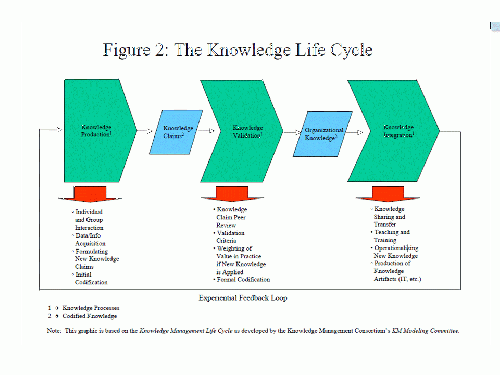Difference between revisions of "Knowledge process"
(→Knowledge production) |
(→Summary) |
||
| Line 10: | Line 10: | ||
== Summary== | == Summary== | ||
| − | knowledge processes includes knowledge production and integration activities with sub processes like acquiring, transforming, developing, disseminating, using, sharing and preserving knowledge as a way to meet specified internal demand that can ultimately improve | + | knowledge processes includes knowledge production and integration activities with sub processes like acquiring, transforming, developing, disseminating, using, sharing and preserving knowledge as a way to meet specified internal demand that can ultimately improve organizational learning. In this regard, knowledge processes helps an organization to gain insight and understanding from best practices. |
==Description== | ==Description== | ||
Revision as of 07:58, 25 September 2013
Contents
Definition
Knowledge process is Knowledge process is a process that acts on /or with knowledge, either individual knowledge or organizational knowledge. Source: [[]]
Summary
knowledge processes includes knowledge production and integration activities with sub processes like acquiring, transforming, developing, disseminating, using, sharing and preserving knowledge as a way to meet specified internal demand that can ultimately improve organizational learning. In this regard, knowledge processes helps an organization to gain insight and understanding from best practices.
Description
There are many different definitions of knowledge processes used in the literature. Authors such as By Mark W. McElroy [1] describe more widely used and accepted definitions into three primary knowledge processes by which knowledge is produced, validated and integrated in organizations.
Knowledge production
- Demand formulation (Internal and external)
- Collecting
- Capturing
- Acquisition
- Identification
- Codification
- Creation
- Generation
- Harvesting
- Identification
- Searching
- Retrieval
- Team learning
- Personal learning
Knowledge validation
Knowledge integration
- Dissemination
- Exchange
- Storage
- Preservation
- Retention
- Representation
- Transfer
- Exchange
- Maintenance
- Updating
- Use
- Reuse
- Sharing
References
[1] Mark W. McElroy, 2002, The New Knowledge Management - Complexity, Learning, and Sustainable Innovation.
